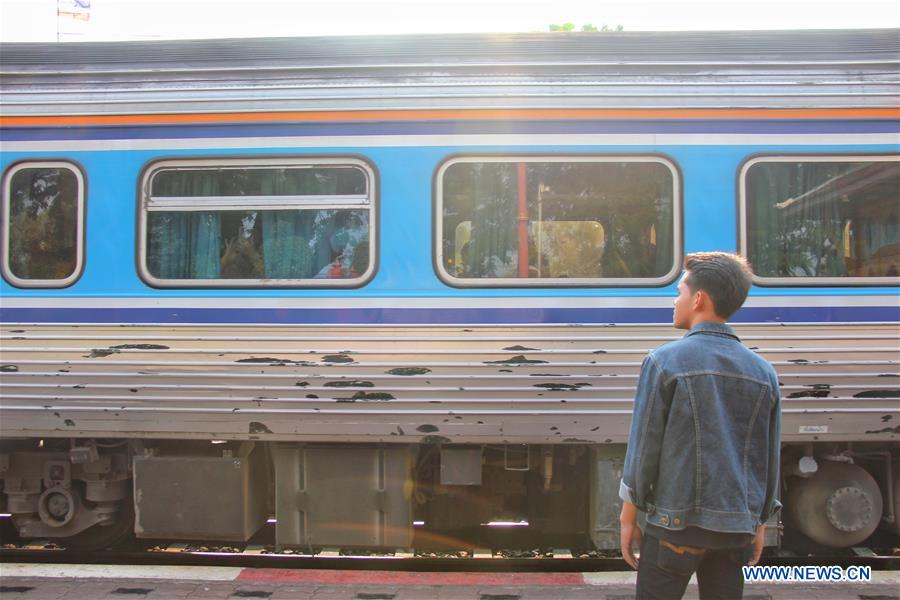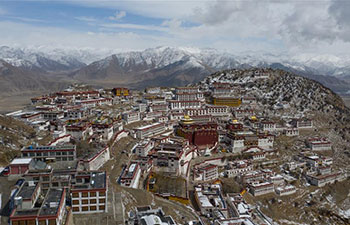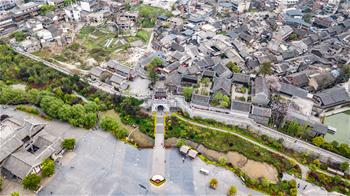
Anupat Tiprat watches a train passing by at Hua Hin railway station in Bangkok, Thailand, on March 15, 2019. Twenty-one year old Anupat Tiprat has been dreaming to become a train driver in his home country Thailand. Later this month, he will travel to northern Chinese city of Tianjin to learn train maintenance and driving for three years. (Xinhua/Yang Zhou)
by Yang Zhou, Guo Xinhui, Thana Nuntavoranut
BANGKOK, April 12 (Xinhua) -- Twenty-one year old Anupat Tiprat has been dreaming to become a train driver in his home country Thailand. Later this month, he will travel to northern Chinese city of Tianjin to learn train maintenance and driving for three years.
"I love trains, my grandma took me to travel by train when I was a kid," Anupat told Xinhua outside a shabby yet colorful house in Hua Hin district of Prachuap Khiri Khan Province, where he lives with his parents.
Anupat was born in 1998 in Si Nakhon District of northern province Sukhothai, where his grandmother, Somneuk Srikeud, has been living. Not long after his birth, his parents left him to grandmother and headed south for work.
Train thus became the bond that linked young Anupat with his parents.
"I took trains southward every four months and I was spellbound by the trains," Anupat said. "Every time when the train negotiated a turn, I could see it from the locomotive to the last coach, it was like magic."
Young Anupat became a super fan of trains then. He painted trains on the walls of his grandmother's house and he lined up bottles to make them look like a train.
At the age of 11, he moved from Si Nakhon to Hua Hin to reunite with his parents, when the family rented a house not far away from the Hua Hin train station.
Every day after school, he would go to the station to look at the inbound and outbound trains. He said he used to sit at the place where the locomotive would stop and ask the driver "How can I be someone like you?"
Later he began to know that one has to enter the Railway Technical School of the State Railway of Thailand (SRT) to become a driver but he lost his chance.
The Railway Technical School admits only a few students, and applicants must have graduated from Territorial Defense School while Anupat, who went to a normal vocational school, did not meet their requirements.
"I realized that maybe I cannot learn train driving anymore, the path was totally stuck and I felt I didn't have any chance to become a train driver in my life."
As a freshman of a vocational colleague, Anupat dropped out and went to work in construction sites.
The pursuit for his dream did not stop here just as an ancient Chinese poem goes: "After endless mountains and rivers that leave doubt whether there is a path out, suddenly one encounters the shade of a willow, bright flowers and a lovely village."
After the China-proposed Belt and Road Initiative was put forward, China and Thailand signed a memorandum of understanding (MoU) on railway cooperation in 2014.
In December 2017, Thailand and China jointly inaugurated the construction of Thailand's first high-speed railway from Bangkok to northeastern province of Nakhon Ratchasima.
Since 2015, several Chinese railway vocational colleges and Thai vocational colleges along with Confucius institutes in Thailand have worked together to foster future railway talents, engineers for the China-Thailand high speed railway cooperation projects.
Working as a construction laborer in January 2018, Anupat encountered a poster on facebook saying Banphai Industrial and Community Education College in Ban Phai district of Khon Kaen province was admitting students who would get Chinese scholarships for rail related majors.
Anupat then contacted Junyar Pabu, the director of the college who explained the project and encouraged him to pursue his dream.
At the same year, Anupat got the chance for a few months' study of Chinese language and rail related knowledge in central Chinese city of Wuhan, where he took a high speed train for the first time.
"If we have a high speed rail linking capital Bangkok with Hua Hin, it would cut the traveling time from some three hours to less than an hour, which will surely bring Hua Hin more tourists and help to develop the local economy," he said.
After he returned to Thailand, Director Junyar recommended him to attend an exam held by Maritime Silk Road Confucius Institute together with Tianjin municipality in order to attain a full scholarship for a 3-year certificate study there.
The few months study in China's Wuhan became Anupat's advantage in competing with other Thai students.
Earlier in March 2019, he won the chance but found the rail-related majors for them to choose this year were only Railway Signal Automatic Control and High Speed Train Maintenance Technology offered by Tianjiin Railway College. There was no train driving.
He was worried and chose the latter one.
After learning about Anupat's worries, Wang Shangxue, the Chinese acting director of the Maritime Silk Road Confucius Institute, one of the officials in charge of the admission, consulted with the Tianjiin Railway College and got positive answers.
"Director Wang told me that the major, High Speed Train Maintenance Technology, also includes train driver course," Anupat said, "I feel like I am a bit closer to my dream."
On March 16, he went back to Si Nakhon of Sukhothai province to visit his grandparents. The house that they used to live was collapsed but a golden shower flower tree nearby was in full blossom.
"He is a good child and he always chose his own path," said Somneuk, Anupat's grandma. "I really want to see him driving a high speed train in Thailand."
Anupat said goodbye to his grandparents in a sunny morning and he was waiting to fly to Tianjin to go on his path to become a train driver.
Thailand has no high speed rail now, but the construction of the Bangkok-Nakhon Ratchasima high speed rail, which applied Chinese high speed rail technology, has already began and the second high speed rail that links Bangkok's two airports with U-Tapao Rayong-Pattaya International Airport is to follow.
Anupat has been looking forward to these rails to be completed when he comes back three years later so there would be more jobs for train drivers.
According to Thailand's plan released by the Ministry of Transport, the Thai government plans to build 2,506 km of high speed rails linking Chiang Mai in the north, Nong Khai in the northeast, Ra Yong in the southeast and Padang Besar in the far south with capital Bangkok by 2037, which, if implemented, would need many high speed train drivers in the future.











